Hereby we publish a translation of an important evaluation by Spanish comrades on the struggle of migrant workers:
 Rally 22/09/2022
Rally 22/09/2022 Masses raising the red flag during the rally
Masses raising the red flag during the rally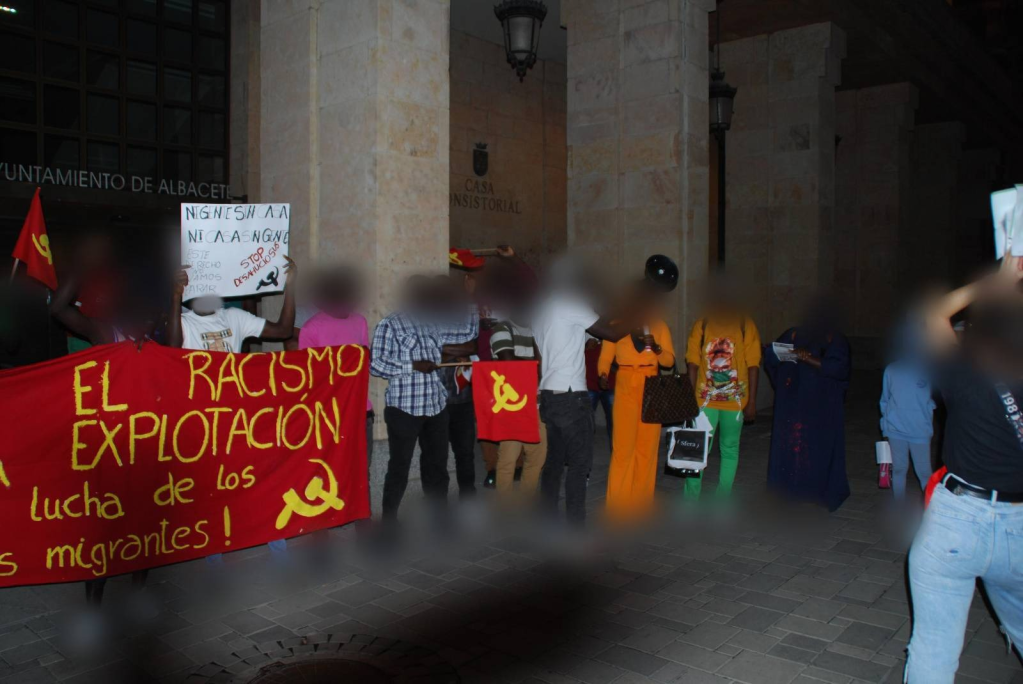 Masses denouncing imperialism by megaphone
Masses denouncing imperialism by megaphoneThe poorest masses mobilise against imperialism and racism
Last Thursday, 22 September, in the city of Albacete, dozens of migrant workers gathered in front of the City Hall, called by the CRA (Revolutionary Committee of Albacete).
The attendees, mostly workers of sub-Saharan origin (i.e. countries dominated by imperialism such as Mali or Senegal), protested against the undignified conditions in which the migrant population is forced to work and live in the Spanish state, against the voracity of imperialism that forces them to flee their countries of origin and against the racism that feeds hatred and justifies violence against one of the most vulnerable groups.
Under the symbol of the hammer and sickle, the migrant working class of the city gathered to denounce a situation that is largely invisible, a violence that is consciously normalised by the agents of the bourgeoisie and imperialism who profit directly from subjecting African workers to the highest degree of exploitation, to the point of bypassing the very legal framework, made to protect their interests as a ruling class.

Just a couple of days earlier, the investigation of an employer in the neighbouring province of Jaén was made public, due to the disappearance of a day labourer who met with him to demand better working conditions. In 2013, another migrant worker who worked for the same employer - known in the neighbouring town as "el matanegros" - disappeared in identical circumstances, and a garment of the young man was found with DNA from the employer, who was only convicted of exploitation.
"How many blacks do we have to die in the camp?" the masses shouted yesterday as they demonstrated.
This is what the migrant workers face when they decide to stand up to the miserable fate that they are forced to face in the imperialist states to which they are forced to migrate: death, hunger and defencelessness.
That is why it is so necessary and relevant that on 22 September 2022, dozens of them have had the courage and the will to try to make themselves heard, to mobilise and organise themselves with their own forces, apart from the false help offered by the bourgeois institutions, by the government parties, of those who want to falsely try to reconcile the interests of oppressors and oppressed, and who ultimately seek to maintain their exploitation, to profit electorally from their struggle and to silence their voice because their testimony is the clear evidence that the capitalist state does not exist to improve the life of the working class, but to maintain their situation of misery.

The poor seasonal workers in the countryside: savage exploitation of imperialism
In the city of Albacete, the situation of the seasonal farm labourers has persisted for decades. For a long time now, the land has been worked by migrant day labourers, who clean the fields, pick potatoes, broccoli, garlic, onions, melons or grapes.
For a long time now, every day throughout the season, hundreds of sub-Saharan workers have been waking up in the early hours of the morning, waking up in the shanty settlement where they live, perhaps having slept on a wet mattress on rainy days, perhaps bruised after an accident due to the lack of light, or with burns caused by the fires of the bonfires; perhaps ill due to the conditions in which they have to keep their food or because they spend the night without thermal insulation.
For a long time now, these workers have been walking to a roundabout where a van will pick them up, take them to a village a few dozen kilometres away, leave them to work in the sun, with hardly any water, or in the rain, for maybe 5 hours, maybe 8, maybe 10, maybe 13.
In that indeterminate number of hours, they may experience fatigue, pain, low blood pressure, a fainting spell, or an accident. They may cut themselves deeply and try to stop the bleeding by covering it with earth, because they have no other means at their disposal, and because if they ask their employers for help, they know that it may happen to them as it has happened to many other colleagues, who are abandoned - consciously or not - at the door of a hospital, forced to lie about the nature of the accident under threat of not returning to work because of the irregular and defenceless situation in which they find themselves.
For a long time now, seasonal workers have been forced to keep quiet, because blackmail, fear of not being able to find another job, threats of denunciation against those who do not have papers, force them to accept conditions of virtual slavery.
They will make them believe that they must swallow, get back into the van that drops them off at the same roundabout, and return to the settlement in which they survive, with just enough time to walk exhausted carrying jugs of water from the nearest fountain, prepare rice for dinner and rest long enough to be exploited for another day, another year.
This poisonous routine has been going on silently for decades, under the absent gaze of the rest of the population, with the complicity of the media, who only turn to look at them to feed their racism, or to use them as a medal or a weapon in some opportunistic argument in the mud of the debate between institutional parties.
Information silence: the bourgeois press lies and conceals mass struggles
Where was the press yesterday? Wasn't what happened in the city for the first time yesterday a relevant event?
The local press was kind enough to publish that the cemetery is going to renovate some stairs, which by chance seems to be a much more interesting news than the fact that for the first time, the migrant population is organising in the city to say enough is enough! to racism and exploitation.
How different they behaved when it was the petty bourgeoisie of the hotel and catering trade who gathered in the Town Hall square to ask for aid after the pandemic while offering their workers disgraceful working conditions!
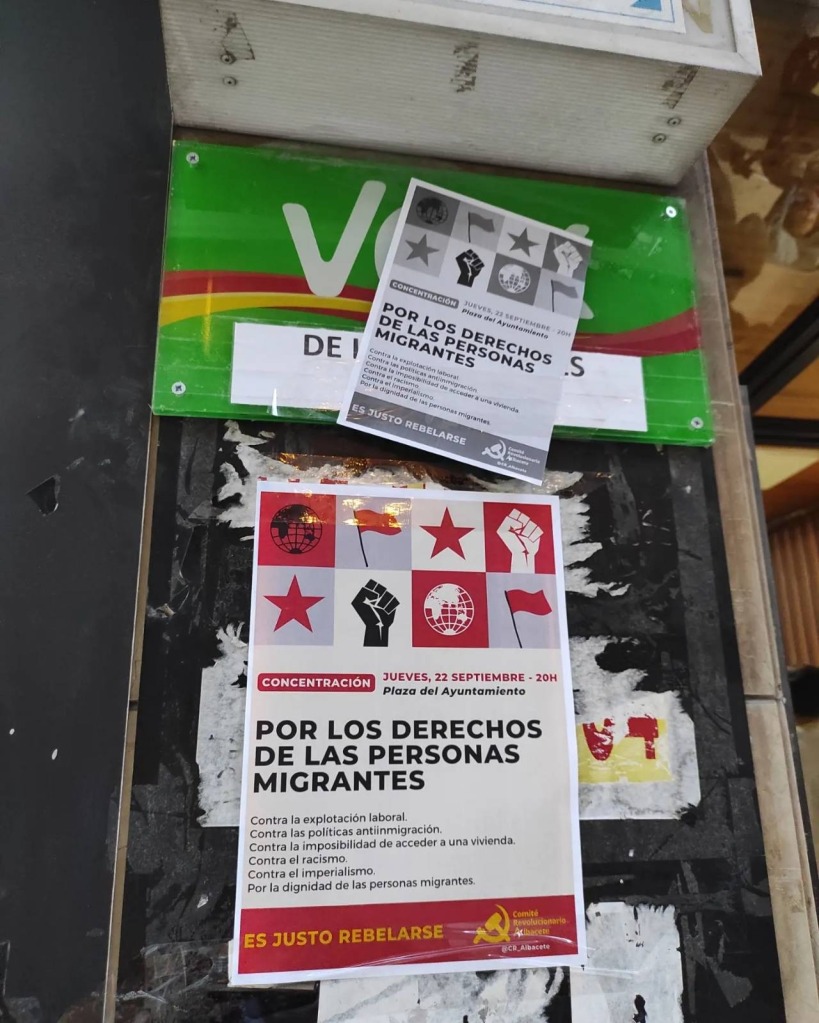
When did the press put the mobilisation of migrants in the city in the spotlight? It did so two years ago, in the summer of 2020, in order to sensationalise racism and reaction, with lurid and continuous publications about the so-called "Revolt of the seasonal workers".
In the middle of the pandemic, and after the detection of some positive cases in the abandoned factory where about 200 seasonal workers were living, they were forcibly confined by the authorities, without being given concrete and updated information on the situation, without providing economic alternatives to people who not only get paid and eat if they work, but also support entire families in their countries of origin.
Positive people were not isolated and non-infected people were separated, but all seasonal workers were indiscriminately confined together, without appropriate security measures, condemning the non-infected to contract the virus. This only showed that the priority for the City Council was not to stop the outbreak, nor to protect the seasonal workers, but to contain the virus to the extent that it did not affect, to put it bluntly, the whites.
These events led to a series of riots in July by seasonal workers who wanted to be able to go to work, who were accused of violence by the authorities and the local press, with the encouragement of the most reactionary sectors who did not hesitate to use this spontaneous outburst of rage as a weapon to spread their discourse.
Subsequently, all the seasonal workers were transferred to the IFAB premises, where their agony and uncertainty continued to drag on, until finally in August, after weeks of confinement and having tested negative in several tests, there was another revolt by the migrants who wanted to leave, but were repressed in their attempt by the repressive forces.
One year after this revolt, four seasonal workers from Mali, Ivory Coast and Ghana have been sentenced to one year and 8 months in prison for the events that took place.
Silence again.
What were the local rulers doing in the meantime? Swearing and swearing that they were going to put an end to the problem of the settlements, which after more than 10 years of existence seemed to have become a priority. A series of measures were proposed, such as the provision of shelter places in the Seminary, or the provision of accommodation in the camp of "La nueva Dehesa" next to the cemetery (an initiative which, by the way, never came to fruition).
A few dozen places in the seminary in conditions incompatible with the pace of life of a farm worker, and an initiative whose main purpose was to temporarily house some of the inhabitants of the settlements at a point further away from the city than the settlements that, with the growth of the city, are increasingly closer to the periphery, most probably for the time necessary to remove the remains of the shacks that seem to "bother".
It would not be surprising considering that this was the policy implemented when the seasonal workers were locked up during the pandemic and the factory in which they lived was demolished. What was the result of demolishing the factory in which they lived? An increase in the number of shacks on the adjacent open field.
For the rest of the legislature, every assessment that has been made to address the issue of substandard housing has been favourable. Apparently the "excellent plans" of the representatives of the bourgeoisie have worked and the settlements seem no longer to exist or at least not to be a problem, which is curious, since as the members of the Revolutionary Committee of Albacete have pointed out on numerous occasions, the settlements not only continue to exist, but are becoming more and more populated.
In the face of the passivity and lies of the bourgeoisie, the Revolutionary Committee together with the migrant workers of the city have been working for months to give visibility to the problem, to build tools to organise this sector of the working class and to carry out activities of service to the people that contribute to alleviate some of the most bloody consequences of the injustice in which they live.
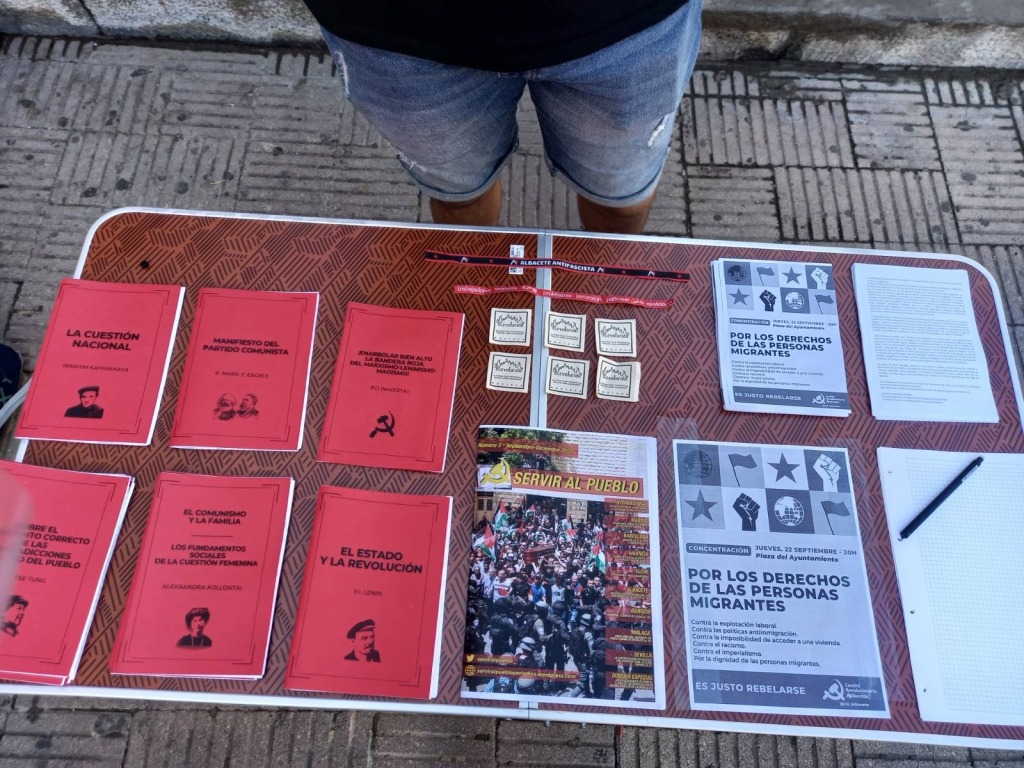
A year of communist struggle among the deep and profound masses

"We communists are like the seed and the people like the soil. Wherever we go, we must unite with the people, take root and blossom in them" (Mao Tse Tung, On the Chungking Negotiations).
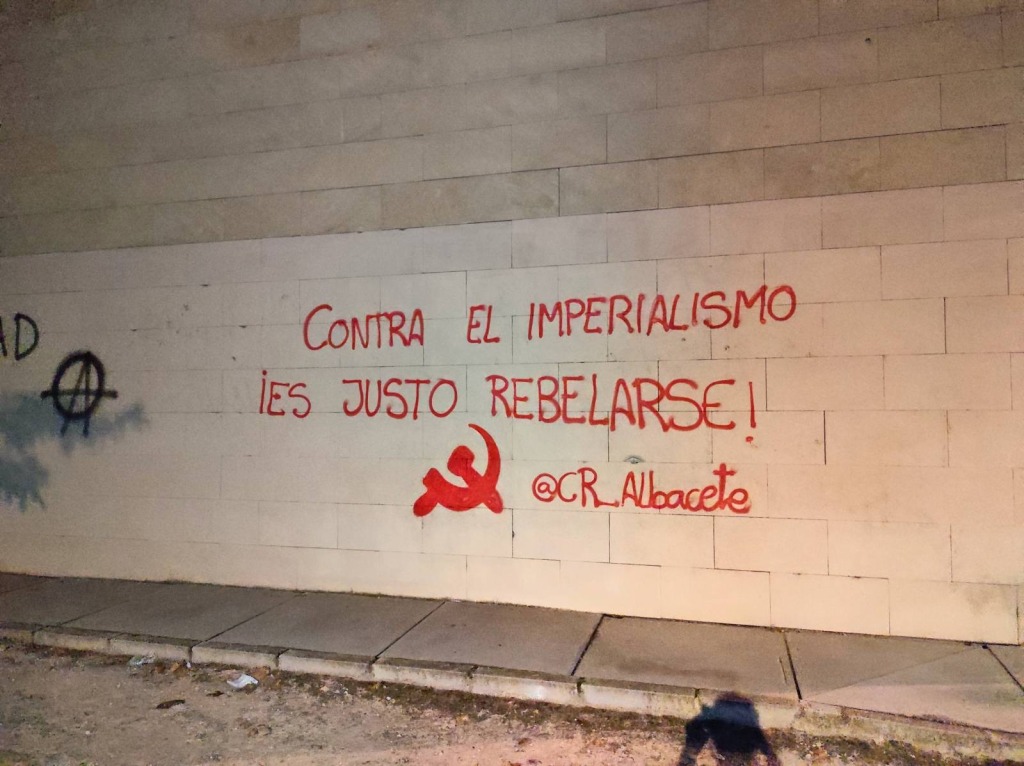
It is just over a year since the Committee began to carry out the first actions to raise awareness in the city about the reality of the settlements, which was followed by a campaign to collect blankets and warm clothes that were distributed among three of the settlements in the city.
Temperatures below freezing are a constant during the winters in this part of Spain, and a fundamental problem for the health of people living in shacks made of plywood boards, without electricity or hot water, and who only have campfires to keep them warm. These fires can cause accidents, burns or fires.
Over the following months, denunciation actions continued to take place.

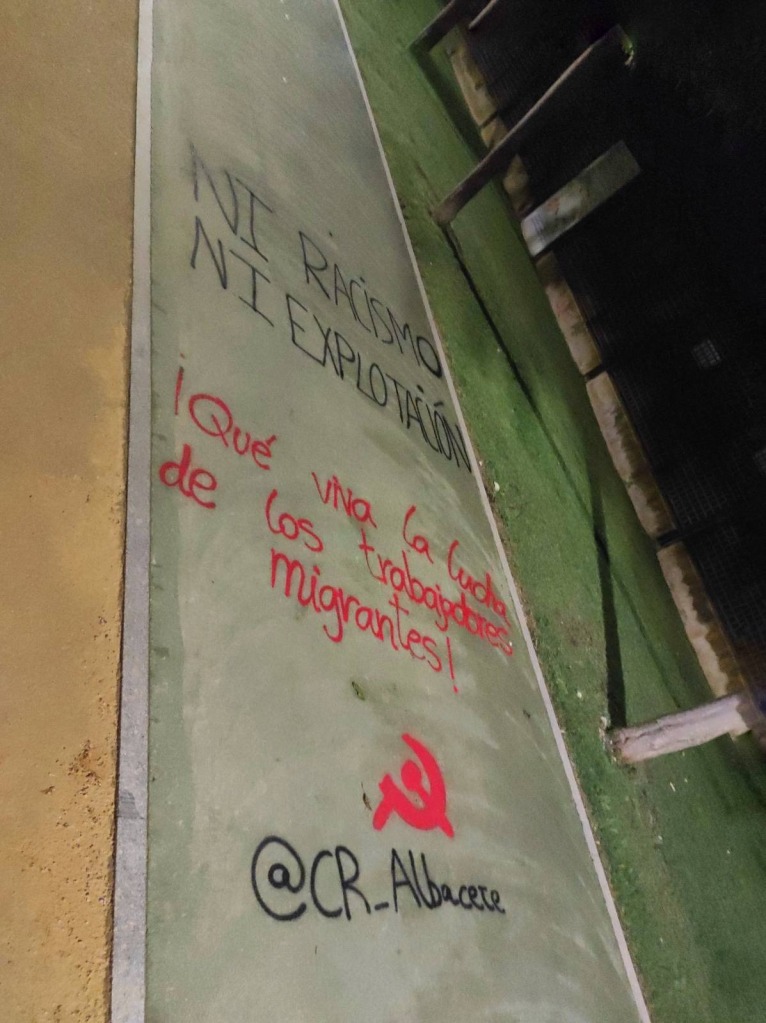 More Graffitti
More Graffitti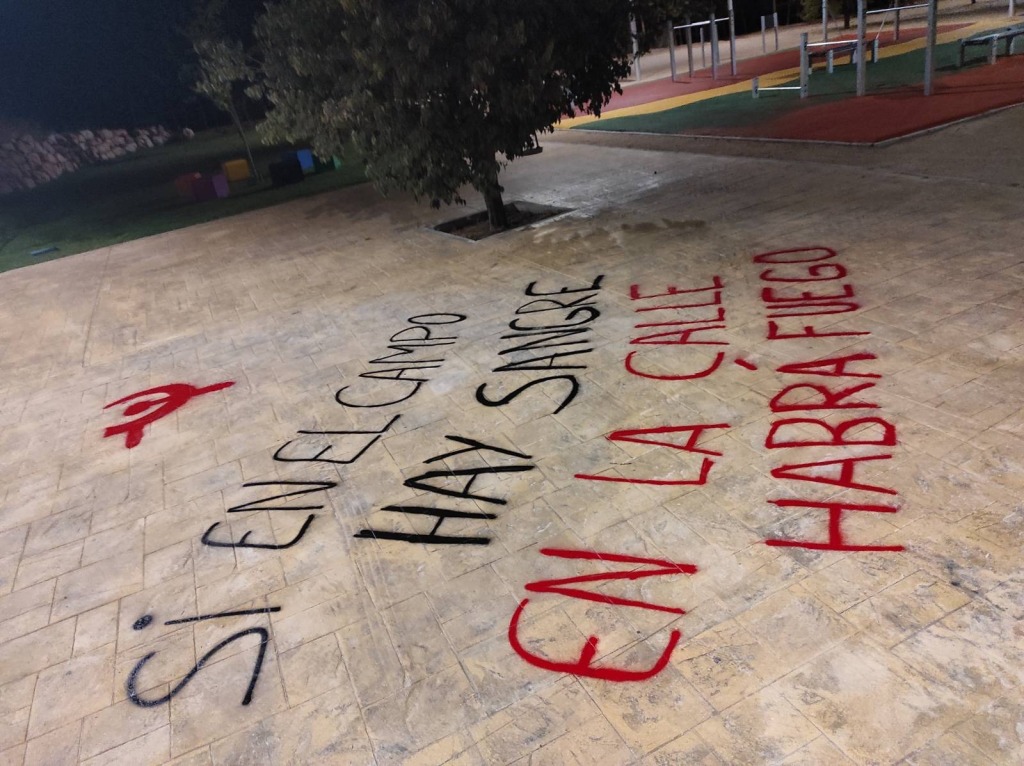
We marched alongside migrant workers in the May Day demonstration, also against the massacre at the border in Melilla, we intensified and systematised assistance in the settlements, we began to give a voice to seasonal workers through interviews, we participated in cultural events organised by African collectives, and we worked continuously and constantly not only to learn about and disseminate their reality and experiences, but also to begin to jointly forge the tools for their organisation.
This last issue is of vital importance in order to be able to differentiate the actions of service to the people and work with the masses from the assistance of certain government bodies or the work of NGOs.
It is necessary to despise the charitable and paternalistic attitude that many organisations have maintained and continue to maintain with the seasonal workers in the countryside of Albacete. Working with seasonal workers cannot be a way to wash consciences while showing passivity or reinforcing the system that gives rise to misery and inequality.
On the other hand, recognising the vulnerability of the migrant working class cannot mean renouncing their organisation, because this means being indifferent to those who force them to embrace their misery. Many of the African migrants now living in Albacete have faced real terror in order to reach the Spanish state and survive here with no other resource than their own strength, in order to have a better life. How paternalistic is it to assume that they do not have enough will and courage to fight for a dignified life and against the violence of imperialism that has put their lives at stake? Is it not prejudiced to assume that they need someone to speak on their behalf or get for them the crumbs promised by reformism?
Nor is there any lack of opinion that it would be more convenient to fight by hiding the ideology, or to tone down the discourse. It is natural for social democracy to advocate this position, since its intention is not only to lower the tone of the discourse, but also the substance of the struggle. What is surprising is when such statements are made by so-called communists, who must either feel self-conscious about their own ideology, showing that they do not trust that this is the right way to fight against the oppression of the international working class, or because they do not trust in the capacity of the masses, who are, after all, the ones who make history.
The mobilisation of the past 22nd shows the communists that it is possible to unite the migrant masses under the hammer and sickle, under the ideology of the proletariat, in the struggle against imperialism and reaction, and that the rejection of those who suffer most cruelly from the consequences of capitalism is not to be feared.
In this sense, the most pedagogical and propagandistic activity on the part of the Revolutionary Committee of Albacete has been going on for weeks prior to the rally.
During these weeks there have been numerous leaflets in the main settlement of the city, information tables in the faculties, agitational work in the neighbourhoods with the highest number of residents of migrant origin, elaboration of posters and banners, graffiti calling for mobilisation, participation in cultural events? All possible efforts have been made to try to lay the foundations for the organisation of migrant workers in the city, to reflect together with them on the problems that affect them, to understand their difficulties and to assert the strength of those who have nothing to lose except their chains.
 Production of a banner for the rally
Production of a banner for the rally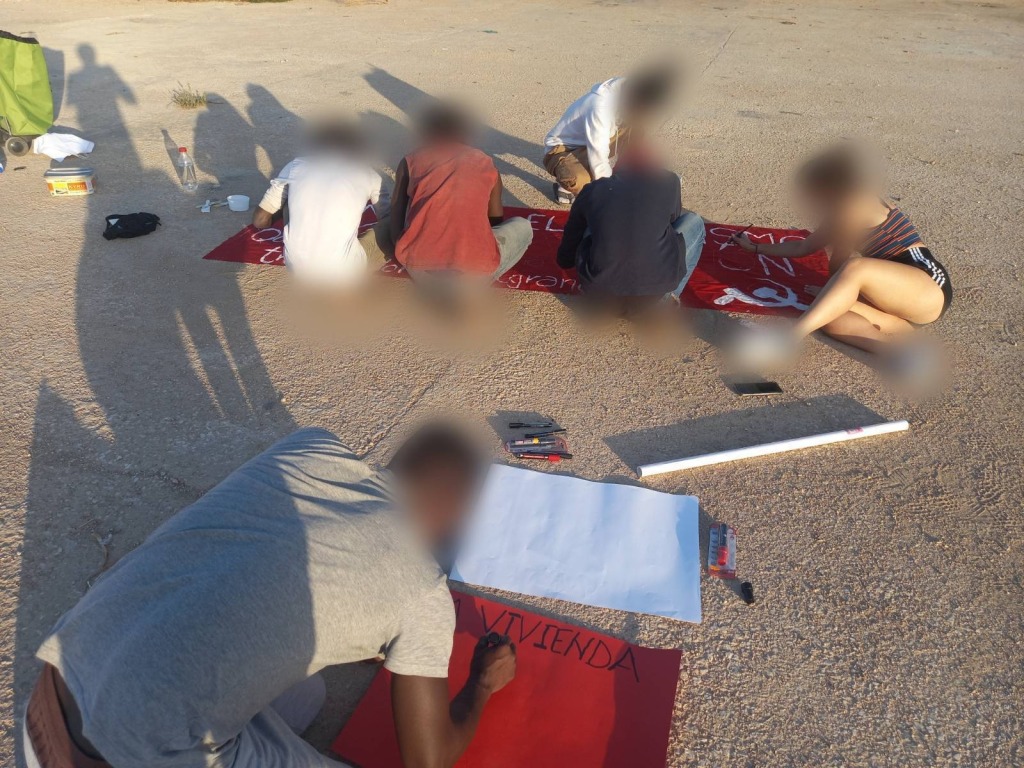 Production of materials for the rally
Production of materials for the rally
 Workers serving the people by providing winter clothing to the masses
Workers serving the people by providing winter clothing to the masses
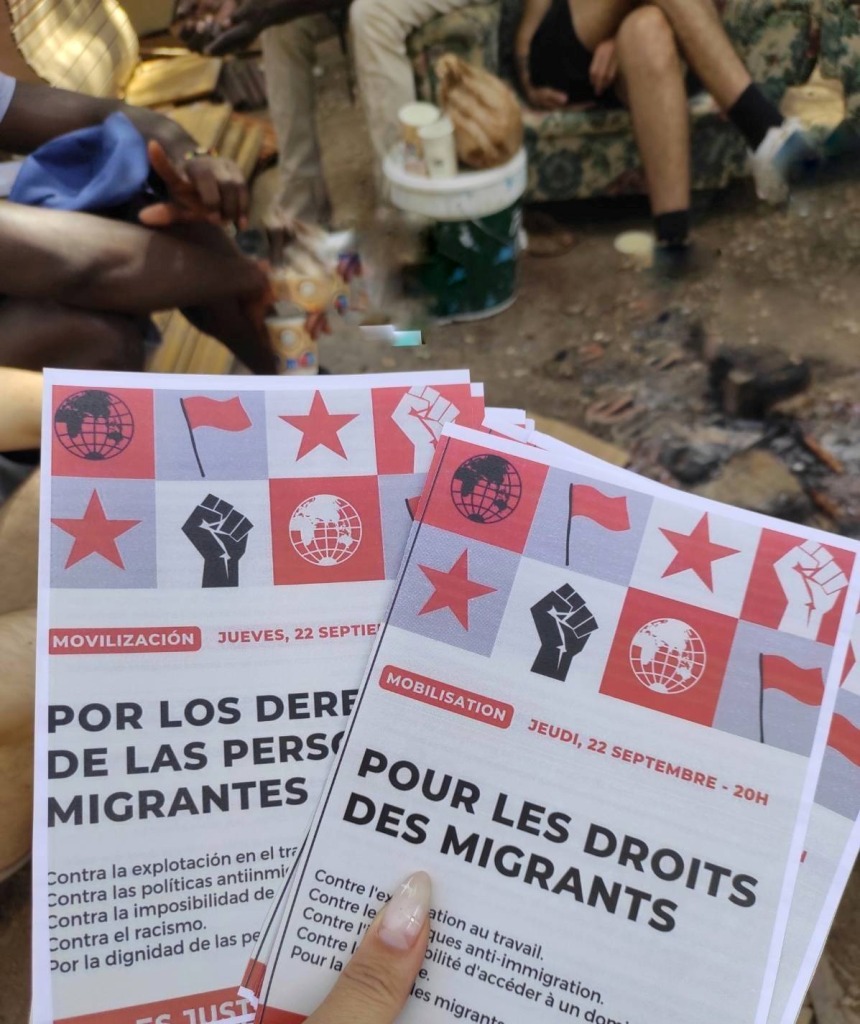

 Working to serve the people by helping to feed the masses
Working to serve the people by helping to feed the massesAll this work prepared the ground for a mobilisation in which dozens of migrant seasonal workers presented their reality and their demands.
"Long live the workers' struggle", "No to racism", "Decent housing and decent work" and "The working class has no borders" were some of the slogans that resounded in front of the Town Hall last Thursday.
Behind a banner with the slogan "Against racism and exploitation; Long live the struggle of migrant workers!", the participants, including seasonal workers who had just arrived from picking grapes, joined the mobilisation for their rights.
Some of those present carried placards with slogans that included some of their fundamental demands, such as access to decent housing, the possibility of regularising their situation and an end to exploitation in the labour sectors where migrant workers are employed.
During the rally, the manifesto that had previously been distributed on leaflets was read out, in which it was stated that "seasonal farm workers in Albacete have been dragging the scourge of misery and poverty for years.
The imperialist plundering of their countries, which generates wars, military dictatorships, violence and hunger, forces them to flee to Europe, where they are promised a better future.
In Spain, one of the main points of concentration of immigrants is Albacete, due to its agricultural situation. In the Albacete countryside they are forced to work, often without papers or a contract, in conditions close to slavery, with long hours, suffering accidents, without labour or legal protection of any kind, working for employers who exploit them to the limit of their strength and abandon them to their fate in the face of any problem. They work for a pittance and survive in overcrowded shantytowns, in unsanitary, dangerous and undignified conditions. In addition to surviving in these circumstances, they are forced to suffer from racism and prejudice, which limit many of their possibilities to change their lives".
The same manifesto pointed out the actions of the institutions of the bourgeois state, their eagerness to apply cosmetic measures, which do not change the reality and living conditions of the migrant population at all. In relation to this, it was pointed out that "behind this inhuman exploitation there is a business that produces thousands of euros a day in profits, both for the intermediary "recruiters" and for the landowners and entrepreneurs of the countryside. These people, who offer conditions that are unbearable for the majority of the population, have found a vein by using labour from other countries, labour that can only continue to be exploited as long as their miserable conditions are maintained, forcing them to choose between piecework or starvation. It is a class exploitation, then, which has deep roots in capitalism and imperialism.
The people of Mali, Senegal, Guinea and so many other sub-Saharan countries dominated by imperialism have suffered the defamation of the media, the violence of the police and the indifference of the institutions, a system designed to perpetuate their misery and force them to live and die far from their families, without a dignified life and without the possibility of building a future that would allow them some freedom".
This mobilisation is far from being the end of the activity, but is the result of many months of shared experiences and selfless work. This is a first experience in their organisation, but behind it continues a work that will be untiring as long as oppression exists. The struggle for the liberation of the oppressed is a struggle that does not end in Albacete, nor at the borders of the Spanish state. It is a struggle that is being waged all over the world against capitalism, against imperialism and its misery.
It is a struggle waged by the masses, who are justly rebelling against the oppression of which they are victims.
The Revolutionary Committee of Albacete vows to continue to fight firmly and constantly for the interests of the migrant masses, against the system that gives rise to their inequality, exploitation and oppression: imperialism, and to fight tirelessly for the reconstitution of the Communist Party to lead the overthrow of the old Spanish imperialist state, a revolution that is an integral part of and at the service of the world proletarian revolution.
Against racism, exploitation and imperialist misery, it is right to revolt!
Long live the struggle of the migrant masses rebelling against imperialism!
Raise high the red flag of the international proletariat!

